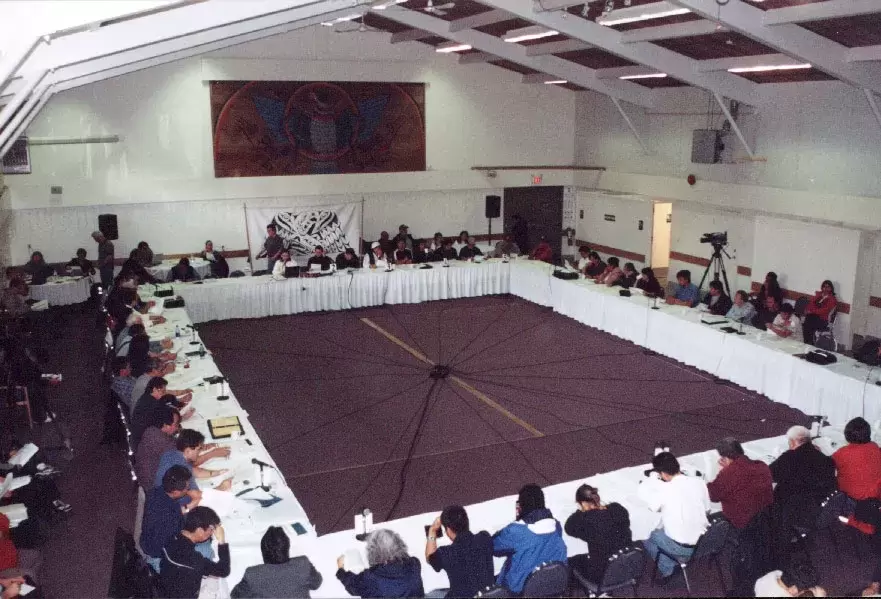The five nations remaining at the Nuu-chah-nulth treaty table will begin work on a new treaty negotiation strategy.
With resolve they agreed to roll up their sleeves to develop a work plan that will move negotiations forward. The treaty team members met Sept. 7 in Campbell River.
Nuu-chah-nulth Tribal Council Executive Director Florence Wylie said she attended the meeting to provide support and guidance to the new Treaty Manager Derek Thompson. She told delegates that she wanted to hear from them about what they envision for the future of the table.
“I know there’s frustration over the lack of progress and I encourage you to be quite open and candid about some of your thoughts today,” she told them.
Delegates from Ehattesaht/Chinehkint, Tseshaht, Mowachaht/Muchalaht, Hesquiaht and Nuchatlaht provided community updates and discussed what they see as obstacles to moving forward in their treaty process.
Archie Little said Nuchatlaht is working hard on governance, constitution and land-use planning. He said more needs to be done in the areas of education and social/health issues, but his nation continues to make small but important steps.
Lyle Billy said Ehattesaht is in the midst of fisheries negotiations with respect to salmon farming.
Billy said it was important to ensure that Ehattesaht leaders sign something that will provide for the next generations to come and not just the next 10 years.
In terms of treaty work Ehattesaht has been working on traditional use maps, making note of resources extracted from their territories. He noted with derision that government continues to designate Marine Protected Areas in Ehattesaht traditional territories, effectively alienating his nation from their land. Ehattesaht is meeting regularly with the federal fisheries and oceans department (DFO) in an attempt to deal with the issue.
Felix Jackson, representing Hesquiaht, said his nation has no mandate for treaty. He said he believes the process is too expensive and hopes see the development of a new, more cost effective treaty negotiation strategy.
Sharon Saasin of Ehattesaht/Chinehkint wondered aloud, “Why are we bargaining our land away?” She said she thinks there needs to be a shift in attitude. Saasin believes getting educated about the historical treatment of first nations people is the key.
“We need to understand what happened; get armed with information. We need to somehow engage our members to be interested in this,” she suggested.
Treaty Manager Derek Thompson advised that much of the technical work in the treaty process has been done. “We have boxes and boxes of information,” he said, adding that work needs to be done on building and managing relationships.
Thompson presented information starting with a timeline of the NTC Treaty Process.
- NTC entered the treaty process in January 1994.
- Hupacasath withdrew in early 2000.
- Ditidaht First Nation negotiated a common treaty table w/ Pacheedaht First Nation.
- The draft Nuu-chah-nulth AIP March 10, 2001 was not ratified. Six nations approved it, but six rejected it.
- Five of the six approving nations joined to form Maa-nulth First Nations and they negotiated a Final Agreement based on the 2001 AIP.
- Seven nations remained at the NTC treaty table: Ahousaht, Ehattesaht/Chinehkint, Hesquiaht, Mowachaht/Muchalaht, Nuchatlaht, Tla-o-qui-aht and Tseshaht.
- Tla-o-qui-aht First Nation withdrew from the NTC treaty table in 2007 and signed on for an incremental treaty agreement.
- Ahousaht withdrew from the NTC treaty table in March 2011.
- The remaining five nations continue at the NTC treaty table with the original vision of working together in a collective effort in the treaty process despite regional differences.
Thompson also listed reasons for the failure of the 2001 AIP ratification. Among the reasons was a lack of communication, overly technical language in the AIP and treaty process, and a lack of engagement with the grassroots people.
After careful review of the information, representatives of the five nations agreed to develop a comprehensive strategic plan for 2011/2012.
Delegates will meet again Oct. 6 and Oct. 7 for a strategic planning session in Parksville. Key representatives of the governments of British Columbia and Canada will be present to discuss their current mandates and objectives. Jim Lornie, Special Representative to the Minister of Indian Affairs and Northern Development on Common Table Issues, will also be in attendance, along with BC Treaty Commission representatives Dave Haggard and Robert Phillips.







